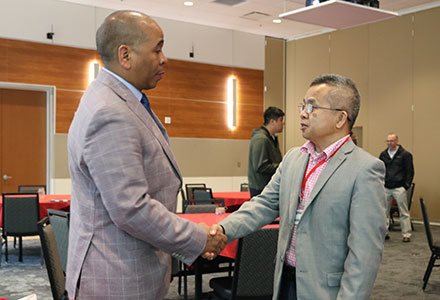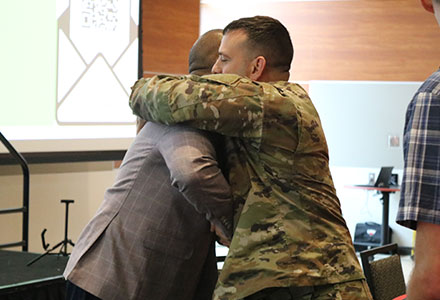Developing Moral Leaders of Tomorrow
UIW Hosts First-Time Moral Leadership Symposium
As part of its Mission, the University of the Incarnate Word (UIW) strives to be an institution dedicated to developing concerned and enlightened citizens within the global community. Although the paths students may take vary in their own unique ways, all chosen paths lead them to become the leaders of tomorrow. However, the University also has the opportunity to support students who are making, or who have already made, strides in leading our great nation.
As a proud San Antonio Military City USA partner, UIW’s Military and Veteran Center supports military-affiliated and veteran students in achieving their educational and professional goals. For the past two years UIW has been honored to be ranked No. 1 in the country in the “Best for Vets” Military Times list, and recently establishing a partnership between the U.S. Army Chaplain Corps, specifically the Unit Ministry Team and the Clinical Pastoral Education (CPE) program at JBSA-Fort Sam Houston.
This Spring, UIW welcomed Executive Officer for the Chief of Chaplains at the United States Army Headquarters Department of the Army Pentagon, Chaplain Colonel Primitivo Davis, as he led the pilot of a Moral Leadership Symposium. This first-time symposium was hosted at the Broadway campus in the hopes of initiating conversations surrounding how one can take charge while considering morality. Chaplain Davis referenced AR 165-1 that notes “The CCH exercises HQDA responsibility for MLT in the Army” (armyresilience.army.mil). He noted that all sub-organizations that fall under the U.S. Army participate in a moral leadership training so that they are better equipped to simultaneously take charge and conduct themselves within the context of ethics.
“Because of our profession, we (active and veteran members of the U.S. Army) often find ourselves in context where there are grave moral implications,” noted Chaplain Davis. “You really have to know the relationship between the actions you take and morality. The U.S. Army Chief of Chaplains, Chaplain Major General William “Bill” Green, Jr., is the proponent authority for moral leadership training for the entire army. This symposium is one of the many efforts where chaplains, like me, can execute moral leadership training in a symposium format.”
The moral leadership symposium was a joint military branch training. Chaplain Davis was joined by Chaplain (Colonel) Charles Seligman, Joint Base Senior Chaplain, Chaplain (Lieutenant Colonel) Stephen Dicks, JBSA Garrison Chaplain, Lieutenant Colonel James Nance, professor of Military Science, Navy representatives Chaplain LCDR Kristian Carlson as well as HMC Haynes Christopher and UIW faculty and students.
 The symposium’s five-day duration welcomed attendees from various levels of Army-affiliated organizations and branches including Army, Air Force and Navy, along with Reserve Officers' Training Corps (ROTC) cadets. Participants traveled from within and beyond state lines to attend, with some driving in from Central Texas-based U.S. Army installation, Fort Cavazos, and others flying in from Florida.
The symposium’s five-day duration welcomed attendees from various levels of Army-affiliated organizations and branches including Army, Air Force and Navy, along with Reserve Officers' Training Corps (ROTC) cadets. Participants traveled from within and beyond state lines to attend, with some driving in from Central Texas-based U.S. Army installation, Fort Cavazos, and others flying in from Florida.
Chaplain Davis notes that the significance of moral leadership spans more than just U.S. Army-based careers. It also serves as a foundation for many other careers including teachers, psychologists and lawyers. All careers come with unexpected challenges that call for effective yet ethical approaches. However, as someone who’s in their third decade of service, Chaplain Davis is no stranger to the challenges that young cadets will face in their chosen field.
“I don't have to ask an ROTC cadet where they're going,” said Chaplain Davis. “I've lived it. No matter what your job is, you will be faced with moral and ethical decisions, and they will be tough. Cadets, although early in their careers, understand that in order to make the hard-right choice, you have to take the time to figure out, ‘what am I going to do and why?’. If we can start getting ROTC cadets to think about moral leadership during the four years that they're in college, that gives them four extra years to prepare before they are in the Army and they, and the people they’ll oversee, are entrusted to make moral decisions.”
Every day of the symposium, Chaplain Davis wore a proud smile as he met the gazes of audience members, both new and experienced. A shared sense of intrigue and genuine contemplation shined in their eyes. The Student Engagement Center ballroom buzzed with conversation as audience members shared their thoughts, wisdom, experiences and hopes. Each voice that was raised encouraged others to contribute to the conversation, weaving a tapestry that connected knowledge across generations.
 Chaplain Major General Green was pleased with how the first-time symposium expanded moral leadership training beyond its usually U.S. Army-centered perimeters and allowed the training to be more accessible to all. By allowing numerous perspectives of different participants to be heard, Chaplain Davis felt that the training became more effective as it reflected the input of various citizens.
Chaplain Major General Green was pleased with how the first-time symposium expanded moral leadership training beyond its usually U.S. Army-centered perimeters and allowed the training to be more accessible to all. By allowing numerous perspectives of different participants to be heard, Chaplain Davis felt that the training became more effective as it reflected the input of various citizens.
“We had a very rich conversation around morality and ethics that includes the perspectives of the 18-year-old freshman in college, the 50-year-old Army colonel and everybody in between. By us all talking, they learned something, and I also learned something. We were all learning. That's what real learning is. It's shared.”
Chaplain Major General Green was excited to partner with UIW in the area of moral leadership training. In the future, he hopes that other installments of the symposium will be hosted at UIW and at other locations that wish to initiate similar conversations. Instead of making the symposium exclusive to one location, he hopes that this model will help to expand its reach to other places throughout the globe, allowing it to grow and improve with each iteration. From his perspective, taking the initiative to welcome others into these conversations and trainings will be beneficial in developing leaders within the U.S. and across the globe that will guide others with accountability and tactful consideration.
“I noted during a symposium session that morality is in every culture, everywhere in the world,” recalled Chaplain Davis. “It may be referred to as something other than morality or ethics, but there is no culture in the history of the world that does not have a moral code. It is a necessity that I encourage everyone to find, no matter their path.”


